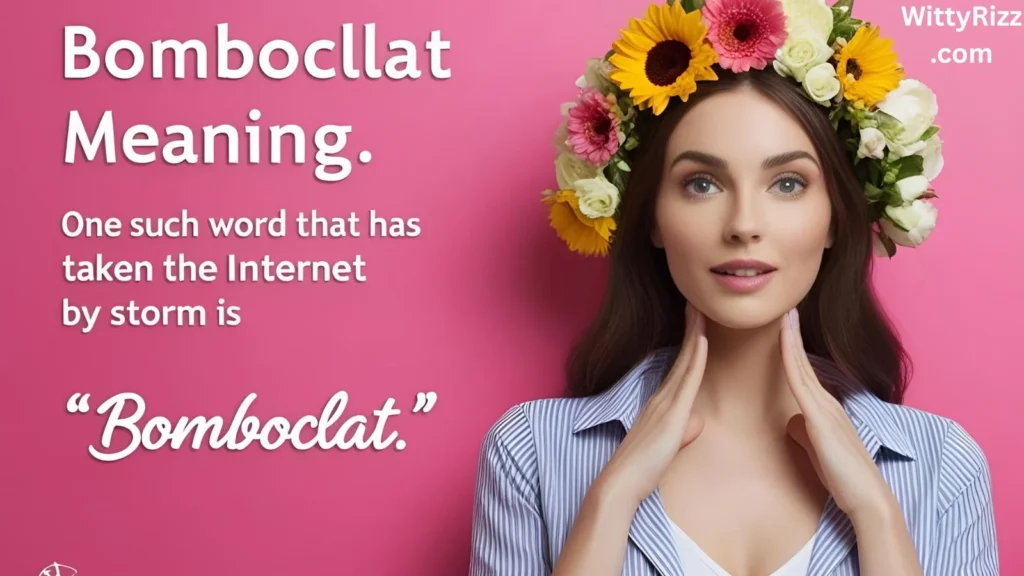Language, especially in our digital age, evolves quickly. Words and phrases from different cultures travel far beyond their origins, picking up new meanings and uses along the way.
One such word that has taken the internet by storm is “bomboclat.”
From memes on Twitter to comments on TikTok, bomboclat has emerged as a bold expression—but what exactly does it mean, and how is it used in text?
This comprehensive article breaks down the meaning of bomboclat, explores its cultural roots, explains how it appears in modern text, and offers 11 alternative phrases that are more polite or professional depending on the context. If you’ve come across this word online and wondered whether you should use it—or what to say instead—this guide is for you.
What Does Bomboclat Mean?

Bomboclat (also spelled bumboclaat, bumbaclot, or bombaclat) is a word with Jamaican Patois origins.
In its traditional form, it is considered a vulgar expletive—a strong curse word similar in tone and intensity to swear words in English. In Jamaican culture, it’s often used to express anger, shock, or frustration.
The term is derived from “bumbo” (a crude term for the human backside or vagina) and “claat” (a dialect version of “cloth,” referring originally to menstrual cloths or toilet paper). Together, they form a word that, in Jamaican society, is highly offensive and deeply rooted in cultural taboos.
The Meaning of Bomboclat in Text
On platforms like Twitter, TikTok, and Instagram, however, bomboclat has undergone a kind of cultural transformation. It’s no longer always used with its original vulgar intensity. Instead, it’s often used in a meme context to react to something shocking, funny, or confusing.
For example:
- Bomboclat: when your friend says they don’t like pizza
- Bomboclat: me seeing my exam results at 2 a.m.
In these online formats, it works as a prompt or a reaction meme, allowing users to express disbelief, confusion, humor, or strong emotion.
Why You Should Use Alternatives to Bomboclat
Even though the meme use of bomboclat has become normalized in some online circles, it’s important to remember its origins and cultural weight. Using it carelessly or in the wrong context can offend others or come off as inappropriate or disrespectful, especially if you’re not from Jamaican or Caribbean culture.
Moreover, if you’re writing for a professional audience, working in a mixed setting, or aiming to be inclusive and respectful, you’ll want alternative expressions that get your point across without crossing lines.
11 Better Alternatives to Bomboclat (With Examples)
Below are 11 alternatives to bomboclat that reflect a range of tones—from casual and humorous to professional and polite. Each one comes with examples to show how it can be used in a sentence.
1. What the heck?!
- Tone: Light, casual
- Use when: You’re surprised or caught off guard by something.
- Example:
What the heck?! Did you see how much that concert ticket costs?
2. No way!
- Tone: Casual, slightly shocked
- Use when: Reacting to something unbelievable or unexpected.
- Example:
No way! He actually showed up on time for once?
3. Are you serious right now?
- Tone: Casual to professional
- Use when: Expressing disbelief or frustration.
- Example:
Are you serious right now? They delayed the meeting again?
4. Wow, that’s wild.
- Tone: Neutral, modern slang
- Use when: Responding to strange or unpredictable news.
- Example:
She quit her job to start a snail farm? Wow, that’s wild.
5. Excuse me?!
- Tone: Assertive, possibly sarcastic
- Use when: You want to express shock, offense, or disbelief.
- Example:
Excuse me?! You’re telling me I was the last to know?
6. Hold up… what?
- Tone: Informal, humorous
- Use when: You need a moment to process something unexpected.
- Example:
Hold up… what? He brought a llama to the party?
7. That’s unbelievable.
- Tone: Professional, respectful
- Use when: Describing something impressive or hard to accept.
- Example:
She ran a marathon in under three hours? That’s unbelievable.
8. I can’t even.
- Tone: Very casual, meme-like
- Use when: You’re at a loss for words (usually humorously).
- Example:
He wore socks with sandals to the interview. I can’t even.
9. You’ve got to be kidding me.
- Tone: Common in both formal and informal situations
- Use when: Expressing disbelief or disapproval.
- Example:
You’ve got to be kidding me. They raised the rent again?
10. That’s ridiculous.
- Tone: Calm, mature
- Use when: You’re criticizing or pointing out how absurd something is.
- Example:
They want us to finish the project in one day? That’s ridiculous.
11. Seriously?!
- Tone: Direct, can be used professionally
- Use when: You’re shocked or annoyed by a situation.
- Example:
Seriously?! This is the third time they’ve changed the deadline.
Choosing the Right Phrase: Tone and Context Matter
When deciding which alternative to use instead of bomboclat, consider the following:
1. Setting
Are you texting a friend, writing an email, or posting on social media? Professional environments usually demand more reserved expressions like “That’s unbelievable” or “Seriously?!”
2. Tone
What mood are you trying to convey—shock, humor, frustration, or excitement? “Hold up… what?” is playful, while “You’ve got to be kidding me” expresses more frustration.
3. Audience
If your audience includes people from diverse cultures, avoid phrases with controversial or offensive roots. Keeping things neutral makes your message inclusive and respectful.
Bomboclat: A Word with Weight
Despite its humorous use in memes, bomboclat is not a word to throw around lightly. Words carry history, culture, and emotional charge. While it’s fascinating to see how a term evolves in digital spaces, we must also recognize and respect its origins.
Jamaican Patois is rich, vibrant, and deserves more than to have its expressions turned into internet memes without understanding. Using alternatives when you’re unsure is not just safer—it’s more culturally aware and ethically sound.
Conclusion
Understanding the meaning of bomboclat is more than just defining a word—it’s about acknowledging how language travels, shifts, and impacts people.
Whether you stumbled upon the term in a meme or heard it in a song, now you know: it’s a strong, culturally loaded word that shouldn’t be used carelessly.
Instead, consider the 11 respectful alternatives provided above to better express your emotions without risking misunderstanding or offense.
Whether you’re writing an email, texting a friend, or posting a meme, there’s always a way to express surprise or shock that’s thoughtful and fitting.

